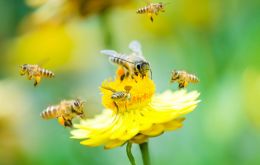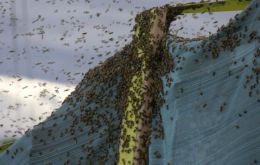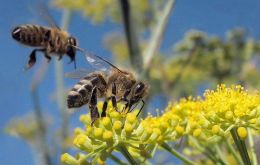MercoPress. South Atlantic News Agency
Tag: bees
-
Wednesday, July 29th 2020 - 08:21 UTC
Declination of wild bees threatens pollination and farm productivity

Wild bees are worth some US$ 1.5 billion to key fruit and vegetable crops in North America, according to new research that warned declines in these pollinators threatens the productivity of economically important agriculture.
-
Tuesday, August 20th 2019 - 20:07 UTC
Brazilian bees decimated by pesticides which are banned in Europe

More than half a billion bees dropped dead in Brazil within just three months, according to Bloomberg. Researchers say the main cause of death is pesticides, which could end up affecting more than the bees.
-
Thursday, June 13th 2019 - 09:15 UTC
Driver's mistake overturns truck and helps escape some 133 million bees

A driver error led to a truck overturning and its cargo of an estimated 133 million bees escaping in the US state of Montana, local media reported.
-
Monday, April 22nd 2019 - 09:00 UTC
Notre Dame miracle: bees and hives on top of the sacristy survived the fire

Notre-Dame's smallest residents have survived the devastating fire which destroyed most of the cathedral's roof and toppled its famous spire. Some 200,000 bees living in hives on the roof were initially thought to have perished in the blaze.
-
Friday, April 12th 2019 - 18:03 UTC
Doctor finds four live small sweat bees living in a woman's eye lid

A Taiwanese doctor removed four small sweat bees living inside a woman’s eye lid, and they were all still alive. The woman, who was reportedly identified as Ms. He, was apparently doing some work outside when the minuscule insects flew into her eyes. The bugs caused agony in He’s eye for hours until she finally received medical attention at a hospital in southern Taiwan.
-
Friday, May 18th 2018 - 08:19 UTC
Europe's top court rules in favor of bees banning three insecticides

The EU's top court has backed an almost complete EU-wide ban on the use of three insecticides, which studies have linked to declining bee populations. Chemicals giants Bayer and Syngenta had gone to the European Court of Justice (ECJ) hoping to get the restrictions on neo-nicotinoids overturned.
-
Saturday, May 24th 2014 - 09:52 UTC
FAO challenge: insects to feed sustainably a world population of 9 billion

Insects can provide a sustainable and environmentally-friendly option for animal feed, in addition to already being a mainstay of human diets for 2 billion people worldwide, FAO Assistant Director-General Eduardo Rojas-Briales told an international gathering of researchers in The Netherlands.
-
Tuesday, April 12th 2011 - 23:17 UTC
Decline of bee population becomes a threat for Chile’s fruit industry

The Chilean fruit industry is being threatened by the rapid decline of the country’s bee population, a product by the country’s ongoing drought.
Water shortages across central Chile are withering the flower buds, depriving bees of their sustenance, the nectar. -
Friday, March 11th 2011 - 00:53 UTC
Decline of bees’ colonies threatens pollination, essential for growing more crops

More than a dozen factors, ranging from declines in flowering plants and the use of memory-damaging insecticides to the world-wide spread of pests and air pollution, may be behind the emerging decline of bee colonies across many parts of the globe.
